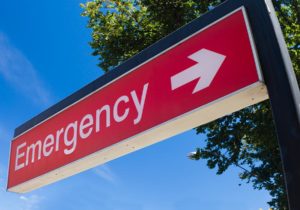When is my Illness or Injury Considered an Emergency?
 When you suddenly don’t feel well, or aren’t sure if you have a more significant injury, it can be difficult to determine what you should treat as an emergency situation and what could be remedied with a simple doctor visit. Unfortunately, many of these questionable problems can occur at night, or when access to a doctor is less readily available except for the emergency room, leaving you to overthink – or underestimate – what may be happening.
When you suddenly don’t feel well, or aren’t sure if you have a more significant injury, it can be difficult to determine what you should treat as an emergency situation and what could be remedied with a simple doctor visit. Unfortunately, many of these questionable problems can occur at night, or when access to a doctor is less readily available except for the emergency room, leaving you to overthink – or underestimate – what may be happening.
While many symptoms can occur in minor medical conditions, it’s important to understand when they become much more serious, requiring an ER visit. Here is a list of common ailments and when they may be something more serious:
- Headache: Headaches can pop up for various different reasons. Common headaches can be caused by stress or too many drinks at the party. Tension headaches, cluster headaches, and migraines may feel terrible and could be somewhat debilitating, but won’t necessarily warrant a trip to the ER. However, if you feel your headache has come on suddenly, as if struck by something in the head, and are experiencing the worst you’ve ever felt, it could be indicative of hemorrhage. Be sure to also take your headache seriously if you are experiencing fever, neck pain, or stiffness and rash, which could be a sign of meningitis.
- Abdominal Pain: According to the National Hospital Ambulatory Medical Care Survey, “abdominal pain is the number one non-injury reason for adult emergency room visits.” This pain can be simple indigestion, or could be something as serious as appendicitis. If you have intense, localized pain in the right, lower portion, or right, upper portion, your appendix or gallbladder may be having a problem that will require immediate surgery. Other emergency situations could be indicated if you are unable to keep down any food or fluids, blood is present in stool, or the pain is sudden and severe.
- Chest Pain: Chest pain can be a scary symptom to encounter, especially if you have a family history of heart attacks or other heart related problems. If you are also experiencing shortness of breath, decreased activity tolerance, sweating, or pain in your neck, jaw or arms, this could indicate a heart attack. While not all chest pain could be this serious, the ER may be the best place to visit as most urgent care clinics will not be able to deal with cardiac issues should a problem be found.
- Infection: Throughout our lives, we may experience several forms of infection, from simple cuts to viruses that make us sick. Unfortunately, many infections, particularly those from a virus, are best left to home treatments until it passes. However, those that come with serious symptoms could require a trip to the ER. If you are experiencing an infection and notice confusion, lethargy, low blood pressure, or inability to drink fluids, you may need further medications to manage or treat symptoms, or IV fluids to curb severe dehydration.
- Blood in Urine or Stool: This can be particularly alarming as blood in your urine or stool is definitely indicative of a problem. However, if no other symptoms are present, making an appointment with your doctor is best, as it may be something like a urinary tract infection, kidney stones, hemorrhoids, ulcers, or more that can all be treated by your physician, or they can help with a treatment plan. If you have fever, rash or fatigue, a large amount of blood, intense pain, or signs of blockage, you will want to go to the ER as the issue could require emergency attention.
- Difficulty Breathing: If you are experiencing ANY difficulty breathing, immediately head to the ER. Most cases are caused by asthma, COPD, smoking or infections, but anytime you are unable to breathe is considered dangerous and should be treated right away.
- Cuts, Bruises, Etc.: Life happens. Cuts and bruises are common and can usually be handled at home with a bandage or some ice. However, if you can see muscle, tendons, or bone through a cut, or a body part is bent that perhaps shouldn’t be, much more than a bandage is going to be needed in order for it to heal properly and avoid serious infection, warranting a trip to the ER.
- Vomiting: No one enjoys this symptom, but it is a common one of stomach flu or food poisoning. Most of the time, this is one that is best treated at home with rest and taking care to stay hydrated. If you notice blood, significant pain, or dark green bilious vomit, visit the ER right away. Also, if you have been experiencing difficulty keeping any fluids down, you may need to visit the ER for dehydration. For adults, it may take a few days for severe dehydration to occur, but for children, it can happen quickly, so be sure to watch them closely.
- Fever: Fever, simply put, is a mere indication that you are sick. While they may not make you feel pleasant, it means you have a healthy immune system, working to fight off any infection. This symptom can usually be treated at home with ibuprofen, but you will want to pay attention to the cause of the fever, as that may indicate the severity of the issue. You should visit the ER if you have a fever and are also extremely lethargic, experiencing an altered mental status, or headache and neck pain. For children, fevers with lethargy are also concerning and should be considered cause for a visit to the ER.
- Loss of Function: Losing any function should be considered a reason to visit the ER. Typically, this symptom is caused by trauma, such as a car accident, or a stroke, but should always be taken seriously. Parts of our body simply do not stop working for no reason, so finding the cause is of vital importance.
While this list only compiles some of the most common ailments seen in emergency rooms, if you are experiencing anything that is causing you to be concerned about your health, or observing any symptoms in a loved one, it is always best to seek treatment right away. If the symptoms appear to be non-life threatening, but still may require treatment, visit us today.




